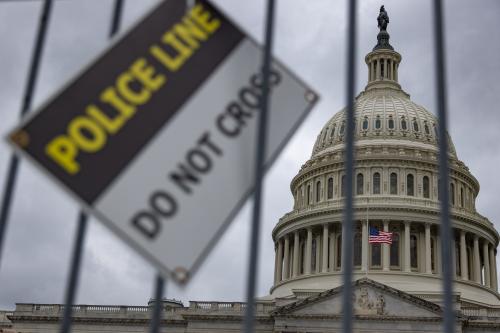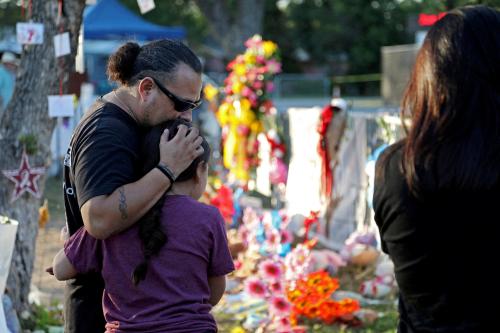This article originally appeared on
Lawfare
.
Since the shock of 9/11, the FBI and other policing agencies have shifted how they deal with terrorism. Instead of seeking to bring terrorists to justice after they have committed, or tried to commit, violence, the police now seek to catch them before they do so.
This has led to the development of a technique where, instead of simply surveilling a potential terrorist plot, they infiltrate police operatives into the plot itself, essentially creating or facilitating the plots in a major way.
Since 9/11 there have been a few dozen plots in which Islamist extremist terrorists have sought, or apparently have sought, to do damage in the United States, and over half of these have been disrupted by this technique. Moreover, the use of the technique is on the rise. Since 2010, some 21 plots to do damage within the United States have been disrupted, and fully 15 of these have used undercover operatives. In most of these plots, police operatives have outnumbered actual would-be terrorists.
The question is whether the (mostly knuckle-headed) would-be terrorists in these cases would have been able to get their act together enough to do much of anything without the participation of the undercover officers. Indeed, at times it seems to be an exercise in dueling delusions: a Muslim hothead has delusions about changing the world by blowing something up, and the authorities have delusions that he might actually be able to overcome his patent inadequacies to do so.
This is a question that was vividly raised by the judge in a case in Newburgh, New York, that has been the subject of an award-winning documentary film. While acknowledging that the men, who were convicted of plotting to bomb Bronx synagogues and shoot down military planes, were “prepared to do real violence,” Judge Colleen McMahon also noted that they were “utterly inept” and on a “fantasy terror operation” and that “only the government could have made a ‘terrorist’” out of the plot’s leader, “whose buffoonery is positively Shakespearean in its scope.” She concluded that, “I believe beyond a shadow of a doubt that there would have been no crime here except the government instigated it, planned it and brought it to fruition.”
But the experience with another case suggests that there could be an alternative, and far less costly, approach to dealing with would-be terrorists, one that might generally (but not always) be effective at stopping them without actually having to jail them.
The case involves a 25-year-old Afghan-American living in northern Virginia who appears to have been as much a pre-terrorist or proto-terrorist as many of the other people who have been arrested, convicted, and sentenced to very long terms on terrorism charges (Case 39 in this free webbook). An angry, frustrated, violent, and perhaps mentally unbalanced hothead, he made dramatic and intemperate threats of violence on Facebook in 2010 to a female correspondent who lived in New Orleans. His profile there contained several photos showing him holding weapons (one an AK-47 rifle) as well as one of a tent full of explosives with a caption sardonically reading, “My family business.” He gleefully bragged to her that “we” had “dropped the twin towers like a bad habit hahaha.”
When he (correctly) suspected that his correspondent was telling the authorities about him, he called her a “bitch” and said he was going to set off explosives on the D.C. Metro the next day.
He made this explicit threat only a week after the FBI had found out about his ravings. Not wanting to take any chances, the FBI promptly arrested him.
Not surprisingly, he did not actually have any explosives, but that hardly makes him unusual among the young hotheads that populate many American terrorism cases, many of whom have been sentenced to decades in prison for plotting murderous crimes. The difference here seems to be that there never was time to employ a cool, calculating, and experienced FBI informant to worm his way into the hothead’s confidence and to encourage, and play on, his propensity to spew bravado. If there had been time to insinuate an informant—particularly a fatherly one, as he seems to have been effectively fatherless—it does seem quite possible the young man could have been moved along the path to terrorism over a few months.
Since irresponsible bloviating is not illegal (if it were, Washington would quickly become severely underpopulated), the police could only charge him with a minor crime: making an interstate threat. He received only a good scare, a penalty of time served, and two years of supervised release.
That approach appears to have worked. Although the FBI may be continuing to monitor him, he seems never to have committed terrorism nor to have been arrested on terrorism charges.
This resembles the Secret Service’s response when they get a tip that someone has ranted about killing the president. They do not insinuate an encouraging informant into the ranter’s company to eventually offer crucial, if bogus, assistance to the assassination plot. Instead, they pay the person a Meaningful Visit and find that this works rather well as a dissuasion device. Also, in the event of a presidential trip to the ranter’s vicinity, the ranter is visited again.
It seems entirely possible that this approach could productively be applied more widely. Plotting to do terrorism is much more like plotting to kill the president than it is like plotting to commit other types of crime. Most crime is essentially a business in which one uses illegal methods to attain money to put food (or drugs) on the table. There are legal ways to do the same thing, but the ultimate goal is fulfilling a requirement of life.
This does not hold either for terrorism or for killing the president—neither is a requirement. And angry ranting about killing the president may be about as predictive that violent action will take place as angry ranting about the virtues of terrorism to deal with a political grievance is. Terrorism cases frequently involve such ranters—indeed, tips about their railing have frequently led to FBI involvement. It seems likely that, as apparently happened in the Metro bombing case, the ranter could often be productively deflected by an open visit from the FBI indicating that the police are on to him. By contrast, sending in a paid operative to worm his way into the ranter’s confidence may have the opposite result: encouraging or even gulling him toward violence.
Terrorism specialist John Horgan has studied people once disposed to committing terrorism who later walked away from it. He points out that this happens all the time and that it does not necessarily require the individuals to change their fundamental views or beliefs. They may remain deeply religious and/or deeply outraged over political grievances. Neither emotion, he finds, is “an operationally useful predictor of terrorist behavior.” A sobering visit by the police may not change beliefs, but in many instances it might productively deflate any propensity to use terrorism to express them.
There is another bit of evidence supporting this proposition. The FBI asserts that three times as many would-be terrorists are arrested or detained on minor Capone-like charges as are involved in the cases leading to explicit terrorism indictments. Effectively, the FBI has put these people on notice that they are being watched. And it seems that few, if any, of these people, after serving short sentences, later moved toward committing terrorist violence in the United States. This suggests that the unpleasant experience was sufficient to dissuade any who were actually inclined to carry out terrorism. (However, those who were deported obviously became limited in their ability to do so within the United States.)
It seems difficult to scare street criminals straight. However, this may not be true for many would-be terrorists of the kind unearthed by the FBI. Indeed, the approach might well have worked with a large percentage of the people who were instead visited, and conned, by undercover informants and then sentenced to long, expensive prison terms.
It is possible that the FBI is already doing this to some degree. If so, it has been a near-total success because there appears to be the only instance in which a man arrested for terrorism had previously received a Meaningful Visit from the FBI.
There is a danger, of course, that, if the FBI warns a proto-terrorist that it is on to him, this action may have the effect of impelling him to move toward terrorism not only more carefully, but also more quickly. The experience in the one case on record, however, suggests this danger may not be terribly severe. The visit did not work to dissuade him, but any negative consequences were minor.
In this recent case, a 20-year-old Kansas man who was scheduled to report soon for basic training in the army, was paid a visit by the FBI after he had posted on Facebook his desire to die while waging violent jihad: “I will soon be leaving you forever so goodbye!” and “getting ready to be killed in jihad is a HUGE adrenaline rush!!” His candid assertion to his visitors that he planned to shoot other soldiers on the firing range or slay them elsewhere on the base with “a small gun or a sword” appears to have rendered him undesirable to the U.S. army, and he was “subsequently denied entry into the military,” as court documents dryly put it. However, he continued to have urgings to carry out holy war, and “confidential sources” later gained his trust. He was eventually arrested as he sought to arm a phony FBI-created 1000-pound ammonium nitrate bomb just outside the perimeter of Fort Riley.
That experience suggests that some continued monitoring of warned suspects may make sense. But the broader experience with the American cases suggests that the Meaningful Visit approach (while holding other, far costlier policing measures in abeyance) might well work with many of the muddled, aimless, gullible, and emotionally inadequate culprits who populate the American terrorism cases in such profusion.
One additional relevant concern seems to have no basis in the American experience: the popular fear that if no encouraging police operatives are infiltrated into an embryonic plot, the proto-terrorists will eventually come across real terrorists to help them out.
Trevor Aaronson notes in The Terror Factory that this argument probably makes sense for many drug stings—eventually those conned would likely otherwise have been able buy or sell drugs on their own. However, as he points out, no would-be terrorist in the United States “has become operational through a chance meeting with someone able to provide the means for a terrorist attack.” Only the police, as it happens, have been able to provide that service.
Much of the concern may be a residue of early fears that al-Qaeda operatives abounded in the United States. In 2002, for example, intelligence sources were telling reporters that the number of trained al-Qaeda operatives in the United States was between 2,000 and 5,000. However, scarcely any of these have ever been unearthed. The government has been far better at counting al-Qaeda operatives in the country than at finding them.
The Brookings Institution is committed to quality, independence, and impact.
We are supported by a diverse array of funders. In line with our values and policies, each Brookings publication represents the sole views of its author(s).




Commentary
Can terrorists be scared straight?
May 5, 2015